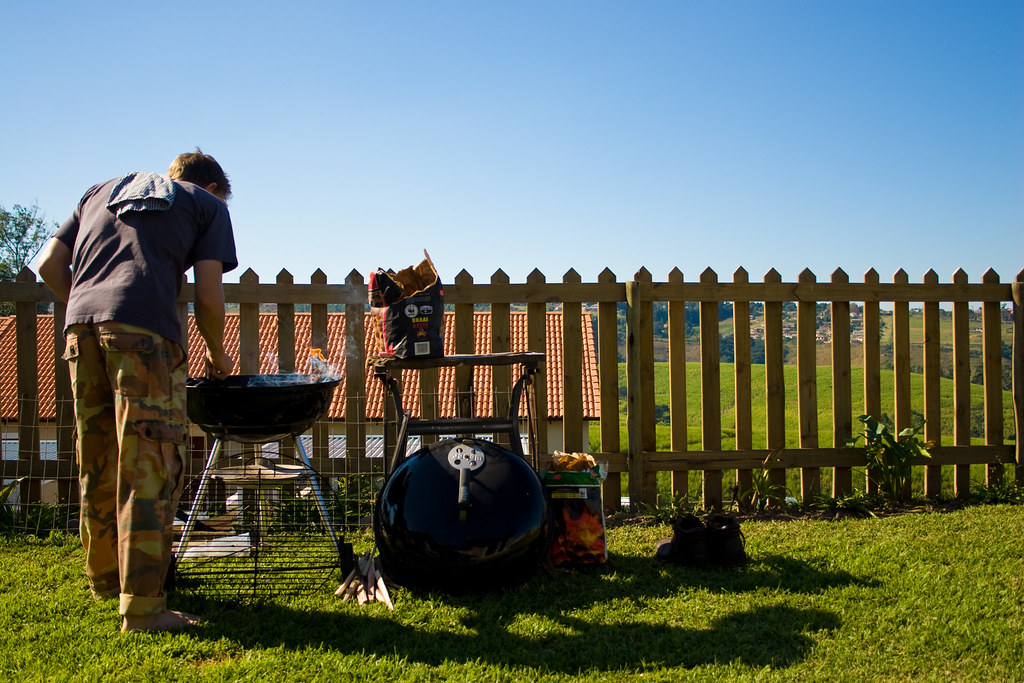Some of my best friends are braaiers
Barbecuing may be the perfect activity to remind South Africa that inequality is the first heritage we need to overcome.

Photo: Quasic, via Flickr CC.
I have always felt uncomfortable with the idea of a ‘National Braai Day’ in South Africa, and the accompanying media bombardment of feel-good messages, advertisements for meat and beer and chat shows where braai (BBQ) recipes are exchanged. We are told that to braai on the public holiday Heritage Day (24 September in South Africa) as this will ‘strengthen South Africa as a nation’. (And to those Afrikaners who phoned in to the radio station yesterday to say the day has nothing to do with politics: you might do well to remember that you only have today off because the Zulu’s wanted to commemorate Shaka.)
Let me state it upfront: I have nothing against braaiing. I love to braai. Some of my best friends are braaiers. When I lived in the UK, the mere idea of meat grilled over a proper fire (not those tin foil boxes you used to burn pork sausages into submission on rainy summer days) used to make me physically homesick. But the idea of Braai Day makes me feel ill at ease for the same reason that those beer ads with multiracial buddies drinking Castle on top of a skyscraper in New York to the tune of Toto’s ‘Africa’ left me uncomfortable. Because it makes us believe we have already arrived in fantasyland. Sure, the purpose of parties, like those around braai fires, is to make us forget reality for a while (that’s probably why they are so popular). But to elevate a party to national heritage status is problematic because it could get us stuck in the gap between the ideal and the reality, and even make us feel quite comfortable there, munching away at our boerewors and braaibroodjies.
People will probably call me cynical and a spoilsport. After all, Braai Day has a champion in the morally unassailable Desmond Tutu. This year, Jan Braai lit a fire under the sea and changed the names of towns to become ‘braai relevant’. There is even a national braai day anthem, for crying in a potjie. I would feel more comfortable with a statement of intent–such as, let’s organize a braai with someone who speaks a different language than us–rather than the ubiquitous feel-good messages (a lot of them corporate-sponsored of course) about how braaiing is supposed to be the one thing that unites us. The usual line is that some people call it braai, others call it Shisa Nyama, others call it barbecue, but – hey, Shosoloza! – it’s the one thing we certainly have in common. This might be true in a trivial sense, but to say that this activity unites us, is more or less the same as saying that just because we all drive on the N1 we are all going to the same address.
And even if braaiing was something we all did have in common, isn’t it quite a depressing thought that it might be the only thing? And is that now a heritage worth a national campaign? Not our resistance to colonialism and apartheid, not our allegiance to the land, not even that our continent is the cradle of humankind – but the dripping of fat in a fire?
But, for a moment yesterday I thought I should suspend my criticism and succumb to fuzzy feelings of rainbow nationalism. My son came home from school with a coloured-in South African flag adorned with slogans such as ‘Being South African means treating everyone equally’. Yes, I thought, human rights is something worth braaiing about. I enjoyed having the afternoon off to watch him run around the athletics track. Across the street, a group of students (all of them white from what I could see) were noisily having a braai. Listening to music, laughing and drinking. It sounded jolly, and I joked with a friend that perhaps I should walk over and ask for a piece of wors in exchange for an extension on their essay due date. But as we walked back to the car after the athletics practice, a bunch of young black kids suddenly came speeding past us. It took me a second or three to realize what was happening. The penny dropped when I saw, behind the group of running kids, the security guard and a student in hot pursuit. ‘Come back here, you &@#%!’ the student, shouted. He was shirtless, clearly a bit drunk, and very angry. It looked like one of the kids might have stolen something from him, probably his cellphone. In a moment of supreme irony, the screaming student addressed the fleeing kids in Xhosa: ‘Yiza! Yiza, you &$%@!’ As a middle-class citizen of this poverty-stricken town I know the irritation of having stuff stolen repeatedly. But I am also familiar with the sight of kids begging on street corners, people rummaging through my rubbish, and the desperation of unemployment. Today the vivid juxtaposition of revelry and desperation, excess and hunger, braaiing students and loitering children just became too much for me. And my heart sank when I realized that when–-not if–-the kids get caught, their crime will probably only breed more violence.
I don’t see anything wrong with lighting a fire and having a good time. But let’s not allow the smoke to get in our eyes. Let’s not forget that we’re still a nation of people who can afford a chop –and-dop, and those who can’t. Perhaps braaiing is after all the perfect activity to remind us that inequality is the first heritage we need to overcome.


















